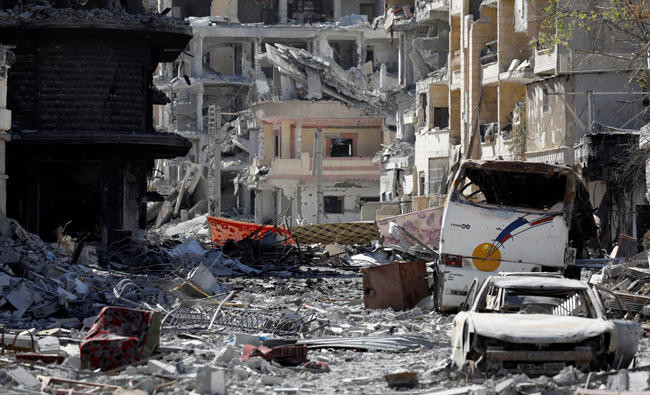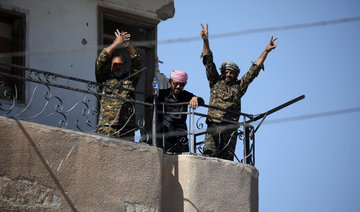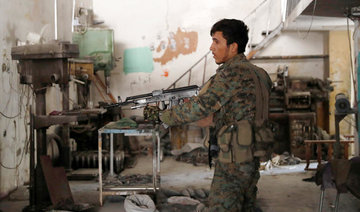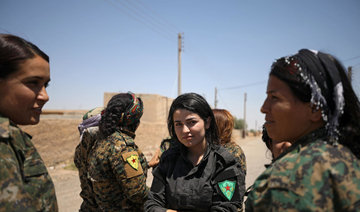RAQQA: US-backed forces combed the ruins of Raqqa for survivors and bombs Wednesday, after retaking the Syrian city from Daesh terrorists and dealing their dreams of statehood a fatal blow.
A lightning final assault by the Syrian Democratic Forces (SDF) on Tuesday saw Daesh defenses collapse faster than expected and the SDF claim a landmark victory in the three-year fight against the terrorist organization.
SDF fighters flushed militant holdouts from Raqqa’s main hospital and municipal stadium, wrapping up a more than four-month offensive against what used to be the inner sanctum of Daesh’s self-proclaimed “caliphate.”
Waving their yellow flags, the Kurdish-led SDF forces celebrated their victory on an infamous traffic circle where Daesh used to carry out public executions and that had become known as the “Roundabout of Hell.”
On Wednesday, teams of SDF fighters deployed across the rubble-strewn streets of Raqqa to look for unexploded ordnance and booby traps left behind by the terrorists. “They are making sure there are no more sleeper cells” in Raqqa, SDF spokesman Mustefa Bali told AFP.
“Mine-clearing operations and the re-opening of the city are underway,” Bali said, adding that his organization would only formally announce the liberation of the city once they are completed.
The SDF and the Kurdish intelligence services issued clear instructions forbidding the tens of thousands of displaced families from attempting to return to their homes.
“We urge our people in Raqqa who fled Daesh rule not to return to the city for their own security until it is rid of terrorist explosives,” the Kurdish internal security services said in a statement.
The loss of Raqqa left Daesh ruling over a small “rump caliphate” straddling the Iraqi-Syrian border and covering a fraction of the territory it held when it declared its “state” in July 2014.
The US-led coalition supporting anti-Daesh forces in Iraq and Syria said on Tuesday that Daesh had lost 87 percent of the territory they had three years ago.
Brett McGurk, the White House’s envoy to the multinational coalition, said on social media that Daesh had lost 6,000 fighters in Raqqa and described the organization as “pathetic and a lost cause.”
Raqqa was one of the most emblematic Daesh bastions, at the heart of both its military operations and its propaganda.
Several of the most high-profile attacks Daesh claimed in the West — such as the 2015 massacres in Paris — are believed to have been at least partly masterminded from Raqqa, earning the city the nickname of “terror central.”
Raqqa also featured heavily in the propaganda videos — from public beheadings to training — which Daesh used to instill fear among the caliphate’s residents and appeal to new recruits globally.
The breakthrough in the months-old operation to retake Raqqa came last week when a local deal was struck for the safe exit of several thousand civilians who had been used as human shields by Daesh and for the surrender of Syrian militants.
It had been believed that up to 400 mostly foreign Daesh fighters remained in the city, prepared for a bloody last stand in their final redoubts. Yet the sequence that followed the announcement on Sunday of the operation’s final phase gives few clues as to their fate.
“Some surrendered, others died,” Talal Sello, another SDF spokesman said, without elaborating further or providing figures.
The Syrian Observatory for Human Rights, a Britain-based monitor relying on an extensive network of sources across Syria, said most of the foreign fighters surrendered and were being held by Western intelligence services.
“They are not visible because intelligence services are detaining them,” Observatory chief Rami Abdel Rahman told AFP. It was not immediately possible to corroborate his claim.
Col. Ryan Dillon, the US-led coalition’s spokesman, only spoke of four confirmed cases of foreign Daesh fighters surrendering and stressed that they were in SDF custody.
“We, as the coalition, do not hold or control any of these detainees,” he said, adding that the SDF may make separate arrangements with the detained militants’ countries of origin for some of them to be handed over and prosecuted.
US-backed forces comb Raqqa after Daesh ouster
US-backed forces comb Raqqa after Daesh ouster

Gaza doctors cram babies into incubators as fuel shortage threatens hospitals
Overwhelmed medics say the dwindling fuel supplies threaten to plunge them into darkness and paralyze hospitals and clinics in the Palestinian territory, where health services have been pummelled during 21 months of war.
While Prime Minister Benjamin Netanyahu discussed the fate of Israeli hostages in Gaza with US President Donald Trump in Washington this week, patients at Al Shifa medical center in Gaza City faced imminent danger, doctors there said.
“We are forced to place four, five, or sometimes three premature babies in one incubator,” said Dr. Mohammed Abu Selmia, Al Shifa’s director.
“Premature babies are now in a very critical condition.”
The threat comes from “neither an airstrike nor a missile — but a siege choking the entry of fuel,” Dr. Muneer Alboursh, director general of the Gaza Ministry of Health, told Reuters.
The shortage is “depriving these vulnerable people of their basic right to medical care, turning the hospital into a silent graveyard,” he said.
Gaza, a tiny strip of land with a population of more than 2 million, was under a long, Israeli-led blockade before the war between Israel and Palestinian militant group Hamas erupted.
Palestinians and medical workers have accused the Israeli military of attacking hospitals, allegations it rejects.
Israel accuses Hamas of operating from medical facilities and running command centers underneath them, which Hamas denies.
Patients in need of medical care, food and water are paying the price.
There have been more than 600 attacks on health facilities since the conflict began, the WHO says, without attributing blame. It has described the health sector in Gaza as being “on its knees,” with shortages of fuel, medical supplies and frequent arrivals of mass casualties.
Just half of Gaza’s 36 general hospitals are partially functioning, according to the UN agency.
Abu Selmia warned of a humanitarian catastrophe and accused Israel of “trickle-feeding” fuel to Gaza’s hospitals.
COGAT, the Israeli military aid coordination agency, did not immediately respond to a request for comment about fuel shortages at Gaza’s medical facilities and the risk to patients.
OXYGEN RISK
Abu Selmia said Al Shifa’s dialysis department had been shut down to protect the intensive care unit and operating rooms, which can’t be without electricity for even a few minutes.
There are around 100 premature babies in Gaza City hospitals whose lives are at serious risk, he said. Before the war, there were 110 incubators in northern Gaza compared to about 40 now, said Abu Selmia.
“Oxygen stations will stop working. A hospital without oxygen is no longer a hospital. The lab and blood banks will shut down, and the blood units in the refrigerators will spoil,” Abu Selmia said, adding that the hospital could become “a graveyard for those inside.”
Officials at Nasser Medical Complex in Khan Younis are also wondering how they will cope with the fuel crisis. The hospital needs 4,500 liters of fuel per day and it now has only 3,000 liters, said hospital spokesperson Mohammed Sakr.
Doctors are performing surgeries without electricity or air conditioning. The sweat from staff is dripping into patients’ wounds, he said.
Earlier this year, Israel imposed a total blockade on Gaza for nearly three months, before partly lifting it. Israel accuses Hamas of diverting aid, something Hamas denies.
“You can have the best hospital staff on the planet, but if they are denied the medicines and the pain killers and now the very means for a hospital to have light ... it becomes an impossibility,” said James Elder, a spokesperson for UN children’s agency UNICEF, recently returned from Gaza.
The latest bloodshed in the decades-old Israeli-Palestinian conflict was triggered in October 2023, when Hamas-led militants attacked southern Israel, killing around 1,200 people and taking 251 hostages, according to Israeli tallies.
Gaza’s health ministry says Israel’s response has killed over 57,000 Palestinians. It has also caused a hunger crisis, internally displaced almost all Gaza’s population and prompted accusations of genocide and war crimes, which Israel denies.
China, Russia should work together for Middle East peace, Beijing says

- Wang Yi said the two countries should push for a diplomatic solution to the Iran nuclear issue
BEIJING: China's foreign minister told his Russian counterpart on Thursday that China and Russia should strengthen strategic coordination to promote peace in the Middle East, according to a ministry statement.
Wang Yi said the two countries should push for a diplomatic solution to the Iran nuclear issue, as he met with Russia's Sergei Lavrov in Kuala Lumpur, China's foreign ministry said.
"Peace cannot be achieved through force, and applying pressure won't solve problems," Wang said, adding that dialogue and negotiations were the way out.
UN calls for ‘immediate deescalation’ in Libyan capital

- The United Nations called for all parties to “engage in good faith” in deescalation and for the “swift implementation of security arrangements” set out during efforts to end the May violence
TRIPOLI: The UN mission in Libya called for “immediate deescalation,” citing reports of armed forces being mobilized in the capital and its surroundings that have raised fears of renewed violence.
In mid-May, there were clashes in Tripoli between forces loyal to the government and powerful armed groups wanting to dismantle it.
In a statement published late on Wednesday on X, the UN Support Mission in Libya (UNSMIL) said there were “increased reports of continued military build-up in and around Tripoli.”
It said it “strongly urges all parties to refrain from using force, particularly in densely populated areas, and to avoid any actions or political rhetoric that could trigger escalation or lead to renewed clashes.”
It called for all parties to “engage in good faith” in deescalation and for the “swift implementation of security arrangements” set out during efforts to end the May violence.
Those clashes left six people dead, the United Nations said.
“Forces recently deployed in Tripoli must withdraw without delay,” UNSMIL said.
Libya has been gripped by conflict since the 2011 overthrow and killing of longtime ruler Muammar Qaddafi in a NATO-backed uprising.
The country remains split between Prime Minister Abdelhamid Dbeibah’s UN-recognized government based in Tripoli and a rival administration based in the east.
In a TV interview on Monday, Dbeibah called for armed groups to vacate the areas under their control.
Among the sites held by armed factions are the Mitiga airport in the east of the capital, which is controlled by the powerful Radaa Force.
“Dialogue — not violence — remains the only viable path toward achieving lasting peace, stability in Tripoli and across Libya,” the UNSMIL statement said.
What to know as Yemen’s Houthi rebels launch new, more violent attacks on ships in the Red Sea

- For the Houthis, attacking commercial ships remains far easier than targeting warships as those vessels don’t have air defense systems
- The attacks on the two ships, the Magic Seas and the Eternity C, represent a new level of violence being employed by the Houthis
DUBAI: In just days, Yemen’s Houthi rebels have begun a new, more violent campaign of attacks targeting ships in the Red Sea, sinking two of them and killing some of their crew.
The assaults represent the latest chapter of the rebels’ campaign against shipping over the Israel-Hamas war. They also come as Yemen’s nearly decadelong war drags on in the Arab world’s poorest country, without any sign of stopping.
Here’s what to know about the Houthis, Yemen and their ongoing attacks.
Rebels involved in years of fighting
The Houthis are members of Islam’s minority Shiite Zaydi sect, which ruled Yemen for 1,000 years until 1962. They battled Yemen’s central government for years before sweeping down from their northern stronghold in Yemen and seizing the capital, Sanaa, in 2014. That launched a grinding war still technically being waged in the country today. A Saudi-led coalition intervened in 2015 to try to restore Yemen’s exiled, internationally recognized government to power.
Years of bloody, inconclusive fighting against the Saudi-led coalition settled into a stalemated proxy war between Saudi Arabia and Iran, causing widespread hunger and misery in Yemen, the Arab world’s poorest country. The war has killed more than 150,000 people, including fighters and civilians, and created one of the world’s worst humanitarian disasters, killing tens of thousands more.
A ceasefire that technically ended in October 2022 is still largely being honored. Saudi Arabia and the rebels have done some prisoner swaps, and a Houthi delegation was invited to high-level peace talks in Riyadh in September 2023 as part of a wider détente the kingdom has reached with Iran. While they reported “positive results,” there is still no permanent peace.
Houthis supported by Tehran while raising own profile
Iran long has backed the Houthis. Tehran routinely denies arming the rebels, despite physical evidence, numerous seizures and experts tying the weapons back to Iran. That’s likely because Tehran wants to avoid sanctions for violating a United Nations arms embargo on the Houthis.
The Houthis now form the strongest group within Iran’s self-described “Axis of Resistance.” Others like Lebanon’s Hezbollah and the Palestinian militant group Hamas have been decimated by Israel after the Oct. 7, 2023, attack by Hamas that sparked Israel’s war of attrition in the Gaza Strip.
Iran also is reeling after Israel launched a 12-day war against the country and the US struck Iranian nuclear sites.
The Houthis also have seen their regional profile raise as they have attacked Israel, as many in the Arab world remain incensed by the suffering Palestinians in the Gaza Strip face.
Houthis attack ships over Israel-Hamas war
The Houthis have been launching missile and drone attacks against commercial and military ships in the region in what the group’s leadership has described as an effort to end Israel’s offensive against Hamas in the Gaza Strip.
Between November 2023 and December 2024, the Houthis targeted more than 100 merchant vessels with missiles and drones, sinking two and killing four sailors. Their campaign has greatly reduced the flow of trade through the Red Sea corridor, which typically sees $1 trillion of goods move through it annually.
The last Houthi attack, targeting US warships escorting commercial ships, happened in early December. A ceasefire in the Israel-Hamas war began in January and held until March. The US then launched a broad assault against the rebels that ended weeks later when Trump said the rebels pledged to stop attacking ships.
Since then, the Houthis have continued occasional missile attacks targeting Israel, but they hadn’t attacked ships until this past weekend. Shipping through the Red Sea, while still lower than normal, had increased in recent weeks.
New attacks raise level of violence and complexity
The attacks on the two ships, the Magic Seas and the Eternity C, represent a new level of violence being employed by the Houthis.
Experts have referred to the assaults as being complex in nature, involving armed rebels first racing out to the vessels in the Red Sea, firing small arms and rocket-propelled grenades. They then have used anti-ship missiles and both aerial and sea drones loaded with explosives to attack the ships.
This coordinated attack sank two vessels in just a matter of days, doubling the number of ships they have sunk. There also is a growing fear the attack on the Eternity C may have been the rebels’ deadliest at sea as crew members remain missing.
The attacks also signal that Israeli and American airstrikes have not stripped the rebels of their ability to launch attacks.
Commercial ships have few defense options
For the Houthis, attacking commercial ships remains far easier than targeting warships as those vessels don’t have air defense systems. Instead, some carry a few armed guards able to shoot at attackers or approaching drones. Downing a drone remains difficult and shooting down a missile is impossible with their weaponry.
Armed guards also typically are more trained for dealing with piracy and will spray fire hoses at approaching small boats or ring a bridge with cyclone wire to stop attackers from climbing aboard. The Houthis, however, have experience doing helicopter-borne assaults and likely could overwhelm a private security detail, which often is just a three-member team aboard a commercial vessel.
Resumed attacks have international and domestic motives
To hear it from the Houthis, the new attack campaign “represents a qualitative shift in the course of the open battle in support of Gaza.” Their SABA news agency said Israel commits “daily massacres against civilians in Gaza and relies on sea lanes to finance its aggression and maintain its siege.”
“This stance, which is not content with condemnation or statements, is also advancing with direct military action, in a clear effort to support the Palestinians on various fronts,” the rebels said.
However, the rebels stopped their attacks in late December as Israel and Hamas reached a ceasefire. The Houthis formally suspended their attacks, though they said ships or companies calling on Israeli ports would remain possible targets.
The rebels also may have reconstituted their forces following the grinding American airstrikes that targeted them. They have not acknowledged their materiel losses from the attacks, though the US has said it dropped more than 2,000 munitions on more than 1,000 targets.
There likely is an international and domestic consideration, as well. Abroad, a new possible ceasefire in the Israel-Hamas war — as well as the future of talks between the US and Iran over Tehran’s battered nuclear program — remain in the balance. The Houthis in the past have been a cudgel used by Tehran, though experts debate just how much influence Tehran wields in picking targets for the rebels.
At home, the Houthis have faced growing discontent over their rule as Yemen’s economy is in tatters and they have waged a campaign of detaining of UN officials and aid workers. Resuming their attacks can provide the Houthis something to show those at home to bolster their control.
Israeli army says intercepted missile launched from Yemen

- The Houthis carried out a military operation using a ballistic missile
JERUSALEM: Israel’s military said it intercepted a missile launched from Yemen on Thursday, with the Iran-backed Houthi rebels later claiming responsibility for the attack, which followed Israeli strikes on Houthi targets.
The Houthis “carried out a qualitative military operation” using a ballistic missile, military spokesman Yahya Saree said in a video statement.
The Israeli military said earlier in a post on X that a missile launched from Yemen had been intercepted following air raid sirens that sounded before dawn in several areas of Israel.
The Houthis began targeting Israel and ships in the Red Sea and Gulf of Aden they accuse of having links to the country after the start of the Gaza war in October 2023, claiming solidarity with Palestinians.
In response, Israel has carried out several strikes on Yemen, including attacks on Sunday on the port city of Hodeida.
The Houthis claimed responsibility this week for the sinking of two vessels, as they resumed their campaign against global shipping in the Red Sea.
Their fresh attacks mark the end of a months-long lull and threaten a May ceasefire with the United States that ended weeks of strikes on Houthi targets in Yemen.
Saree said the Eternity C bulk carrier, which was first attacked on Monday, was headed for the Israeli port of Eilat and was attacked in support of Palestinians in Gaza.
Saree warned companies dealing with Israeli ports that their ships would be targeted until Israel was forced to “lift the siege” on Gaza and end the war.
The Houthis said Monday that they had boarded and sank another vessel, the Magic Seas, a day earlier, because its owner had done business with Israel and used its ports.
Houthi attacks have prompted many shipping firms to make the time-consuming detour around the southern tip of Africa to avoid the Red Sea, which normally carries about 12 percent of global trade.




















